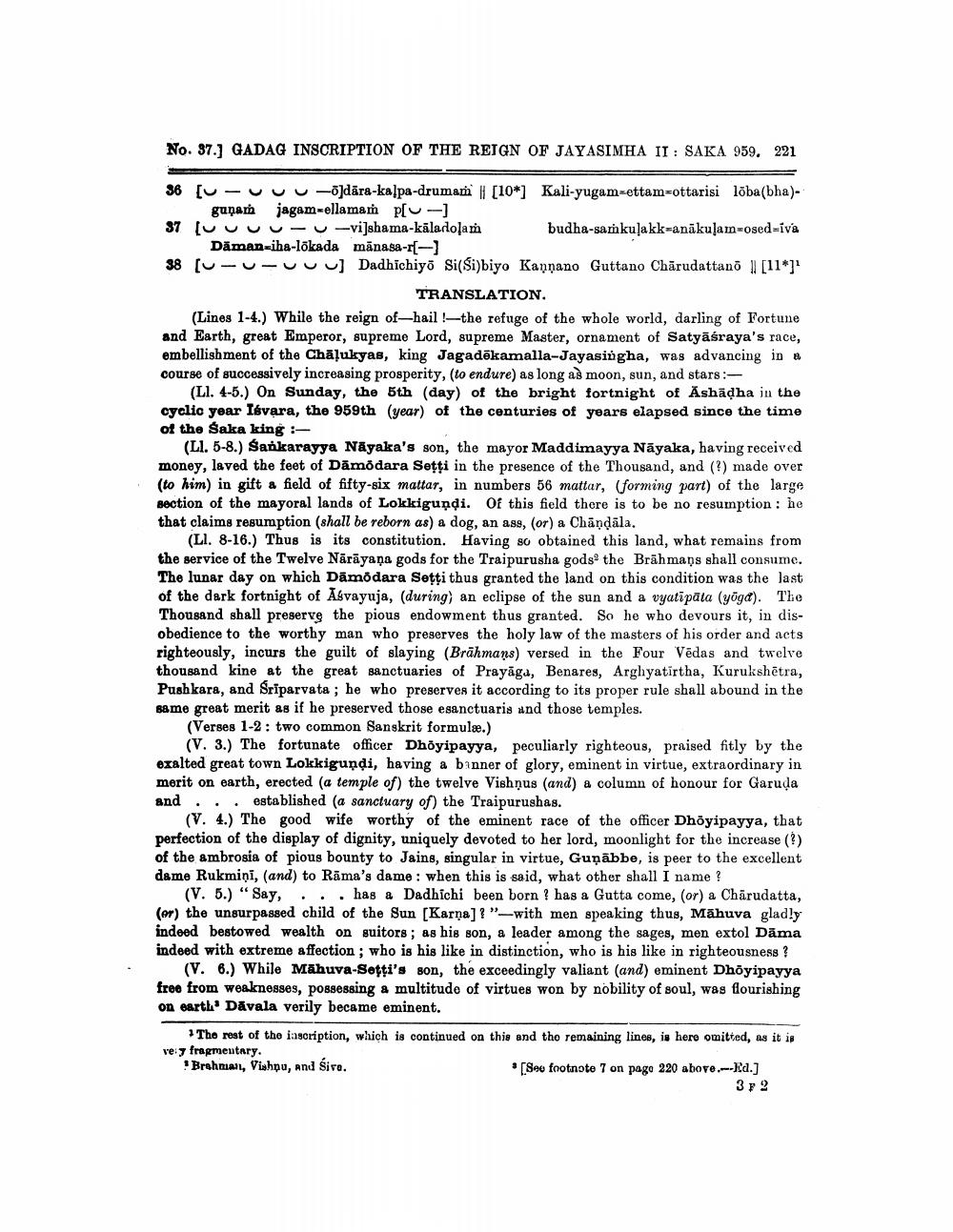________________
No. 37.] GADAG INSCRIPTION OF THE REIGN OF JAYASIMHA II: SAKA 959. 221
36 [~~~ -ō]dāra-kalpa-drumam || [10*] Kali-yugam-ettam-ottarisi lōba(bha)gunam jagam-ellamam p[-] 37 ~~~~- -vi]shama-kāladoļam Daman-iha-lõkada manasa-r[-]
budha-samkulakk-anākuļam-osed-iva
Dadhichiyō Si(Si)biyo Kannano Guttano Charudattanō || [11*]1
TRANSLATION.
--] 88
(Lines 1-4.) While the reign of-hail!-the refuge of the whole world, darling of Fortune and Earth, great Emperor, supreme Lord, supreme Master, ornament of Satyasraya's race, embellishment of the Chalukyas, king Jagadekamalla-Jayasingha, was advancing in a course of successively increasing prosperity, (to endure) as long as moon, sun, and stars:
(Ll. 4-5.) On Sunday, the 5th (day) of the bright fortnight of Ashaḍha in the cyclic year Iévara, the 959th (year) of the centuries of years elapsed since the time of the Saka king :
(Ll. 5-8.) Sankarayya Nayaka's son, the mayor Maddimayya Nayaka, having received money, laved the feet of Damodara Setți in the presence of the Thousand, and (?) made over (to him) in gift a field of fifty-six mattar, in numbers 56 mattar, (forming part) of the large section of the mayoral lands of Lokkigundi. Of this field there is to be no resumption: he that claims resumption (shall be reborn as) a dog, an ass, (or) a Chandala.
(Ll. 8-16.) Thus is its constitution. Having so obtained this land, what remains from the service of the Twelve Nārāyaṇa gods for the Traipurusha gods the Brahmans shall consume. The lunar day on which Damodara Setți thus granted the land on this condition was the last of the dark fortnight of Asvayuja, (during) an eclipse of the sun and a vyatipata (yoga). The Thousand shall preserve the pious endowment thus granted. So he who devours it, in disobedience to the worthy man who preserves the holy law of the masters of his order and acts righteously, incurs the guilt of slaying (Brahmans) versed in the Four Vedas and twelve thousand kine at the great sanctuaries of Prayaga, Benares, Arghyatirtha, Kurukshetra, Pushkara, and Sriparvata; he who preserves it according to its proper rule shall abound in the same great merit as if he preserved those esanctuaris and those temples.
(Verses 1-2: two common Sanskrit formulæ.)
(V. 3.) The fortunate officer Dhōyipayya, peculiarly righteous, praised fitly by the exalted great town Lokkigundi, having a banner of glory, eminent in virtue, extraordinary in merit on earth, erected (a temple of) the twelve Vishnus (and) a column of honour for Garuda and... established (a sanctuary of) the Traipurushas.
(V. 4.) The good wife worthy of the eminent race of the officer Dhōyipayya, that perfection of the display of dignity, uniquely devoted to her lord, moonlight for the increase (?) of the ambrosia of pious bounty to Jains, singular in virtue, Gunabbe, is peer to the excellent dame Rukmiņi, (and) to Rama's dame: when this is said, what other shall I name?
(V. 5.) "Say, .. has a Dadhichi been born? has a Gutta come, (or) a Charudatta, (er) the unsurpassed child of the Sun [Karna]?"-with men speaking thus, Mahuva gladly indeed bestowed wealth on suitors; as his son, a leader among the sages, men extol Dāma indeed with extreme affection; who is his like in distinction, who is his like in righteousness?
(V. 6.) While Mahuva-Setti's son, the exceedingly valiant (and) eminent Dhōyipayya free from weaknesses, possessing a multitude of virtues won by nobility of soul, was flourishing on earth' Davala verily became eminent.
The rest of the inscription, which is continued on this and the remaining lines, is here omitted, as it is very fragmentary. Brahman, Vishnu, and Sive.
*[See footnote 7 on page 220 above.--Ed.]
32




